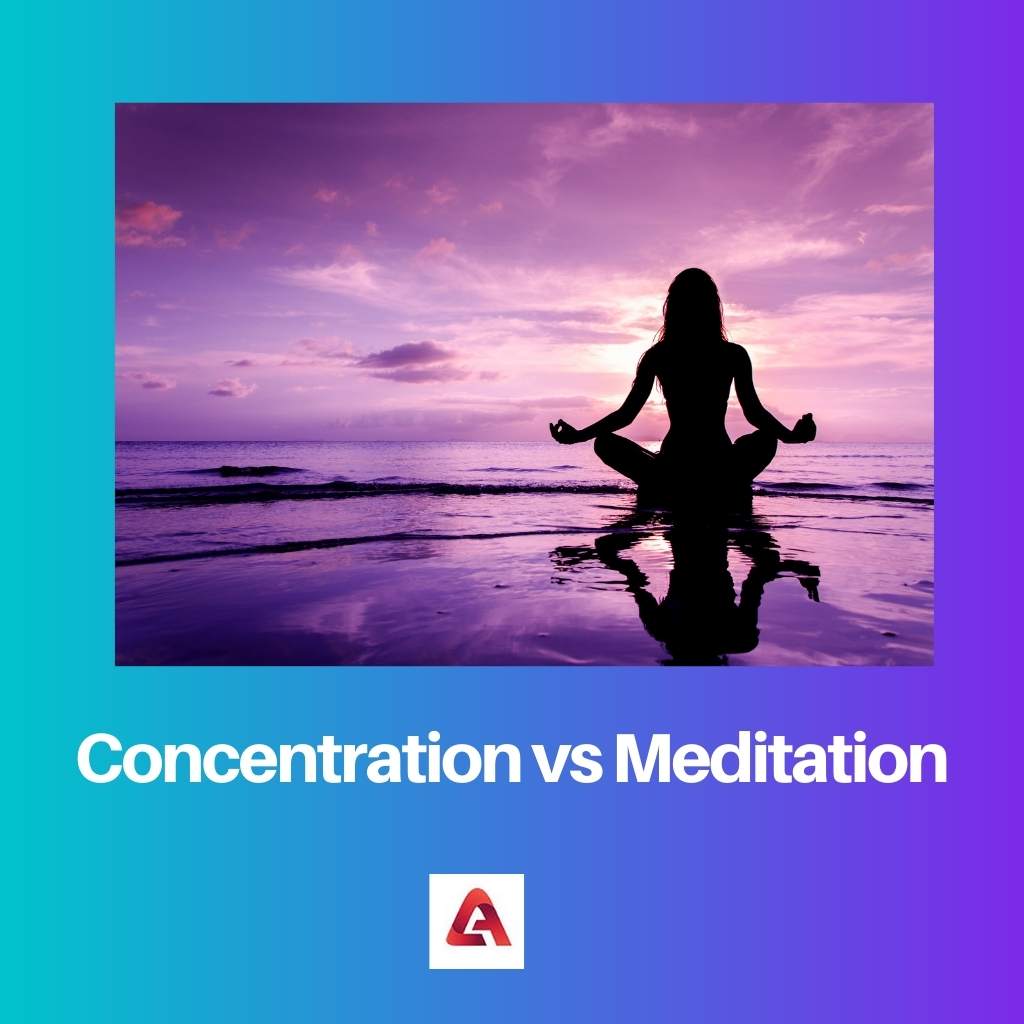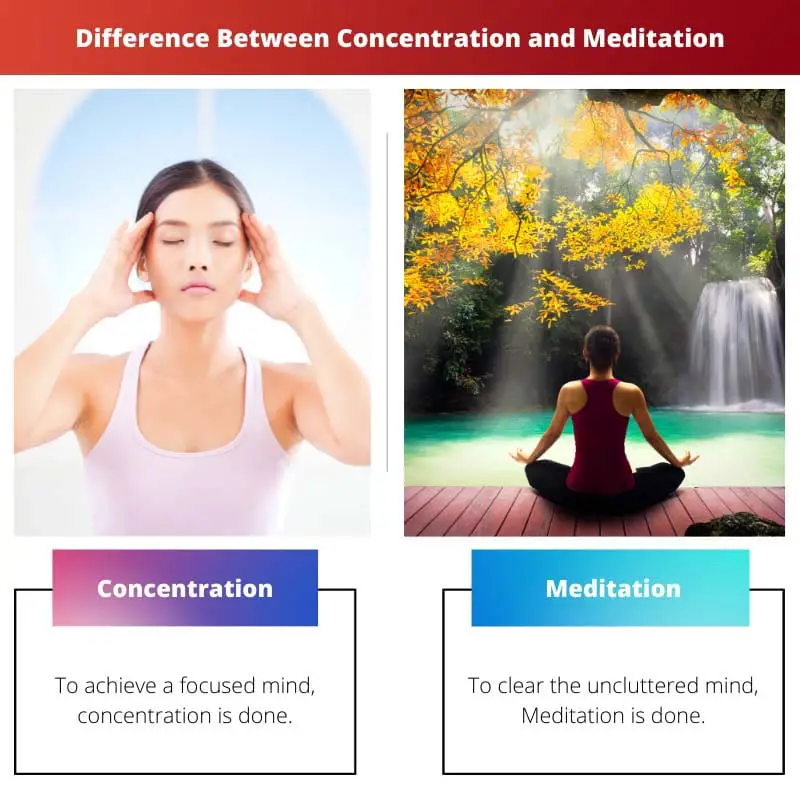In simple words, a mental state is a mental condition. The mental state is connected to our mind, and the mind has several states like love, anger, hate, pleasure, pain etc.
The mental state of mind is a hypothetical condition and is related to cognitive psychology. Concentration and Meditation are the mental states of mind. Both are confused with each other. But it is very different from each other.
Key Takeaways
- Concentration involves focusing the mind on a specific object or task, while meditation involves quieting the mind and being present.
- Concentration is used to improve productivity and mental clarity, while meditation reduces stress and increases self-awareness.
- Concentration can be practised in short bursts throughout the day, while meditation is done in a quiet, peaceful environment for longer periods.
Concentration vs Meditation
Concentration involves directing attention to a specific subject, enabling the mind to focus on the task. Meditation is a more holistic approach that promotes mental clarity, inner peace, and self-awareness by embracing techniques such as deep breathing and visualization.

Concentration is the ability of a person to direct all of the attention or focus on one particular thing using willpower. In concentration, we become self-focused and attentive so that we do not get distracted by another thing.
It also means that at a time, all our attention, mind, and energy are focused on one thing and not jumping from one place to another. Only one thought is going on in the mind. Control your mind and being attentive requires a lot of training.
Meditation is something that uses the concept of mindfulness to achieve a calm and stable peace of mind. Meditation has been performed since early ages in different religious traditions.
The earliest record of doing meditation was found in the Vedas. Meditation was referred to as a dhyana. It plays a significant role in both Hinduism and Buddhism.
It reduces stress, anxiety, depression, pain etc. and makes our minds peaceful. Sense of perception and concept of well-being is developed.
Comparison Table
| Parameters of Comparison | Concentration | Meditation |
|---|---|---|
| Definition | To achieve a focussed mind, concentration is done. | To clear the uncluttered mind, Meditation is done. |
| Found | The concept of Concentration was found by William James in 1890. | The concept of Meditation was found firstly in Vedas. |
| Activity | Concentration requires brain activity and a variety of mental exercises like visualization, focusing, and repeated recitation. | Meditation requires almost no brain activity or very little. |
| Consciousness | It requires a little consciousness to perform mental activities. | In this, an individual doesn’t have a consciousness of action. |
| Useful | It recollects our memory, helps on focus, good for studies, faster comprehension etc. | It reduces stress, depression, anxiety, and pain and enhances peace, perception, and well-being. |
What is Concentration?
Concentration is the bigger part of Attention. Attention means basically to focus on a task, object or subject. In contrast, Concentration means maintaining attention for a certain period.
In our day-to-day life, both concentration and attention are required. Because to do or complete a work, we need to concentrate. If we want to start new activities or do something new, then concentration is also required.
Concentration helps us recollect our memories and information. Concentrating is very important because if we don’t do it, all our information will be lost or forgotten.
It is very important that while concentrating, one should pay attention and be away from distractions. To increase our concentration, we can do certain activities like reading books, short stories or newspapers.
Always start with small things. Try to complete the task and concentrate on it while performing.
Power of Concentration has become an essential skill in today’s world. Everyone should possess this skill or try to possess it. Concentration is a spontaneous activity and uncontrolled also.
It can happen at any time if you are interested in doing a task. The whole energy of one’s mind gets concentrated on a particular thing, which helps you to focus and pay attention.
A person achieves the desired results. It can cause tiredness and fatigue because a lot of activities are involved in it. It comprises both the inner and outer world, unlike Meditation.

What is Meditation?
Meditation is related to mindfulness. The record of practising Meditation has been found in the Vedas, and also it plays a crucial role in all religions but specifically in Hinduism and Buddhism.
It was in the 19th century when meditation and its techniques began to spread rapidly in Asian countries, first and then in other cultures. Now it has found its way even into business and health as well.
The term Meditation is derived from the French and Latin word ‘meditation which means to think, to ponder. Almost in every tradition or culture, meditation was present in one form or another, whether it be Christianity, Hinduism, Judaism, Islam etc.
Meditation is defined as something which can calm your mind, relax and soothe you. Meditation is something in which you meditate and try to go beyond the world.
There are different types of positions and asanas of Meditation. For example, in Buddhism, Jainism and Hinduism, there are asanas like half-lotus, full-lotus, Burmese, Seiza, and kneeling positions, which are popular.
Some religions use prayer beads which is a kind of devotional meditation. Meditation is also meant through which one gets enlightenment, as described in Buddhism when Gautama Buddha got it.
Meditation is also a means through which you can reduce stress, depression, anxiety, and pain, enhance perception, get peace, and become self-conscious about yourself and your well-being.

Main Differences Between Concentration and Meditation
- To achieve a focused mind, concentration is done. It requires control and awareness. To clear the uncluttered mind, Meditation is done. It requires awareness for a longer time.
- The concept of Concentration comes from Attention which is very much like Concentration and was founded by William James in 1890. The concept of Meditation was found firstly in Vedas and Greek mythology.
- Concentration requires brain activity and a variety of mental exercises like visualization, focusing, and repeated recitation. Meditation requires almost no brain activity or very little.
- Concentration requires little consciousness to perform mental activities as you focus on the inner and outer worlds. In this, an individual doesn’t have a consciousness of action. Because you only focus on the inner mind.
- Concentration recollects our memory and helps on focussing, which is good for studies, faster comprehension etc. Meditation reduces stress, depression, anxiety, and pain and enhances peace, perception, and well-being.

- https://books.google.com/books?hl=en&lr=&id=Pcw6AwAAQBAJ&oi=fnd&pg=PP1&dq=Concentration+and+Meditation&ots=iehig0g9aM&sig=gOHXeAc6cYzE83BdudjbxYaWV1E
- https://www.mdpi.com/1424-8220/19/7/1612

It’s interesting to explore the concepts of concentration and meditation. Both practices are valuable for improving mental and emotional health, yet they serve different purposes.
Absolutely, concentration aids memory and focus, whereas meditation helps reduce stress and promote peace of mind.
Yes, it’s essential to understand the unique benefits of concentration and meditation for better mental states and overall cognitive well-being.
The ability to concentrate is crucial for recollecting memories and focusing on tasks. Concentration is spontaneous and uncontrolled, essential for effective cognitive functionality.
Concentration and meditation are crucial for improving mental and emotional health. Recognizing these distinct states and practicing them can lead to lasting cognitive well-being.
Concentration involves directing attention to a specific subject, while meditation is a more holistic approach that promotes mental clarity, inner peace, and self-awareness using deep breathing and visualization.
Yes, concentration and meditation have distinct qualities and benefits. Learning to practice both can lead to emotional and mental stability, and overall well-being.
Understanding concentration and meditation is crucial for maintaining mental clarity and emotional balance. Both practices contribute to overall cognitive enhancement and stress reduction.
Absolutely, the ability to differentiate between concentration and meditation is vital for improved cognitive health and emotional stability.
Concentration and meditation are vital skills for enhancing cognitive health. Understanding their distinctions enables individuals to utilize them appropriately for various mental and emotional benefits.
Absolutely, recognizing the significance of concentration and meditation can lead to improved overall mental well-being and healthier cognitive functionality.
Indeed, the ability to practice both concentration and meditation allows individuals to manage stress, improve focus, and achieve lasting emotional stability.
Concentration and meditation play a significant role in enhancing our mental states and overall well-being. Understanding the differences between them is important for personalized mental health strategies.
Definitely, the ability to effectively utilize concentration and meditation can lead to improved mental clarity, emotional stability, and stress reduction.
Concentration and meditation are mind states that involve the mind and its cognitive psychology. Concentration involves focusing on a specific object or task, while meditation involves quieting the mind and being present. Both are different but important for mental health.
Understanding concentration and meditation can help individuals identify the kind of mental state they need at different times, and use them effectively for various benefits. It’s vital for improved cognitive health.
I completely agree. It’s important to recognize the differences between these states and practice them to improve mental clarity and overall well-being.
Concentration and meditation are essential practices for achieving cognitive balance and emotional stability. Embracing both techniques can lead to improved mental clarity and overall well-being.
The concept of concentration involves focusing on a particular task, while meditation helps achieve a clear and uncluttered mind. These aspects are crucial for cognitive enhancement and mental balance.
Absolutely, both concentration and meditation are essential tools for maintaining cognitive functions and promoting mental and emotional stability.